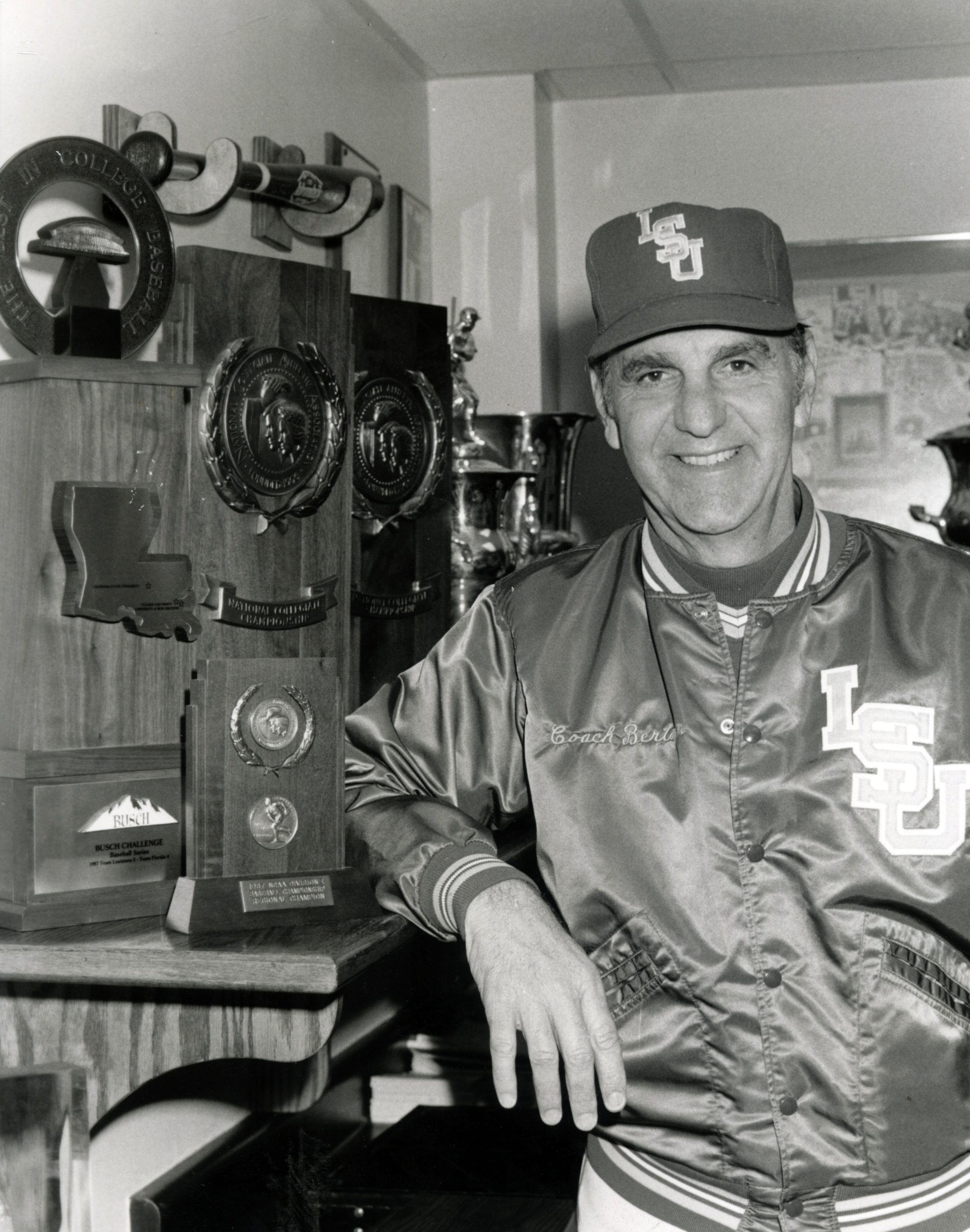
Never known as a man who lacks candor, nor one to shy away from promoting his team, his school or himself if it benefitted his cause, former LSU baseball coach and Athletic Director Stanley “Skip” Bertman, the college baseball coaching legend, who is now 84 years old and who coached his last college game more than two decades ago is still very clearly on top his game.
Not only does Bertman remain involved in the LSU baseball program he built from the ground up – and it is not only in an advisory-only capacity or a token sense – he is also still passionate and opinionated about it, but nothing about it escapes his purview.
Bertman sat down with Tiger Rag Editor Todd Horne in January 2023. It was a lunch meeting at Bertman’s favorite restaurant, Mike Anderson’s on Lee Drive in Baton Rouge.
Bertman drove himself.
The appointment was originally booked for an hour, and the subject matter planned to be discussed was straightforward: a brief lookback on Bertman’s legendary career and a preview of the 2023 LSU Baseball Tigers under second-year coach Jay Johnson.
The sit down lasted for four hours.
Enjoy Part One. Tiger Rag Magazine will publish more from the Sit Down in future issues.
TR: Coach, what are your thoughts, what is your assessment of the LSU baseball program right now? Your “State of the Union,” so to speak?
SB: I’m real pleased with Jay (Johnson) – in fact, I couldn’t be more pleased with him. He’s a super stud of a guy and an absolutely wonderful coach.
TR: Let’s talk about Jay Johnson and this 2023 LSU baseball team, but first let’s discuss how LSU baseball got to this point. Obviously, everyone is expecting big things from this year’s team in Jay’s second season.
But first, let’s look back. You are credited – rightly so – with building the LSU baseball program from the ground up into one of the nation’s best, if not the best college baseball program that there is.
You laid a solid foundation and took LSU baseball to unprecedented heights. In 1984, your first season, baseball at LSU was nothing more than an afterthought, and you transformed the program into what it became. Fair to say?
SB: I agree with that. Thank you very much. We had a lot of help along the way, worked really hard and had a vision and a plan.
TR: You led LSU to five College World Series championships and seven Southeastern Conference championships in 18 years as head coach. All told, in your 18 seasons as the skipper, LSU had 16 NCAA Tournament appearances and 11 College World Series appearances, which is unheard of.
Smoke Laval, your former assistant, who you chose to replace you, coaches for five seasons when you retire – from baseball. Smoke takes LSU to two College World Series berths, two NCAA Super Regional titles, three NCAA Regional championships, one SEC title, two SEC division championships and two Top 10 finishes, but he resigns in June of 2006.
You are, at the time, LSU’s Athletic Director, which we will get into more later, about how that came about, but you’re looking for someone to come in and take over the baseball program.
You hand-pick Paul Mainieri. In 2007, Paul comes in and does a wonderful job, wouldn’t you say?
SB: Paul did a nice job.
TR: Probably not has strong as you would have liked?
SB: No, but he did do a good job under the circumstances when Smoke left.
Paul’s assistants were really good, very strong, at the start. Then, his assistants got head coaching jobs. The LSU brand is so strong. So, the two coaches for Jay last year got head coaching jobs. I get a kick out of that . . . not that they’re bad coaches. But all the sudden, they’re head coaches. They tried to be head coaches all their lives and they work one year with LSU, then boom, they’re head coaches. The brand is terrific, especially in baseball.
But it’s good in all areas.
You have to realize, LSU is a much better school, overall, than it was when you went there (1980s).
It’s a much, much, much better university. In 1983, 84, 85, 86, 87, and even in 1988, I was shocked. Literally, I was stunned and amazed. I could take almost any kid who was a 12 on his ACT and get him into school because they had to take everybody who graduates. So, I had a lot of kids – and, of course, they went to remedial studies, which was new to me. But I didn’t pay any attention to it. I just checked their grades. Most of them graduated because I was very intense about it, and because it was easy to graduate. They had all these ridiculous classes you could take you know? it is totally different today. It averages between a 26, 27 ACT, and LSU is a much better university.
TR: Coach, when you first arrived in the summer of 1983, what was the LSU athletic department and overall university administration like?
SB: It’s hard to explain what it was like. It’s hard to describe. They were uninformed. They did not know what to do and they did not have anybody in leadership who knew . . . Bob Brodhead came in, and he had some great ideas. But it was too fast. He was ahead of his time, so to speak. He was too fast and he was too tenacious for the people around here. They couldn’t tolerate him.
TR: One of Brodhead’s great ideas was hiring you, right?
SB: Well . . . Brodhead hired (Bill) Arnsparger. He hired Sue Gunter. He hired coaches, he was really good at hiring good because he knew where to go to find them. And none of us made a lot of money, so that wasn’t a big issue in those days. Like I started for $30,000 and it wasn’t a big issue for me. I’ve never really been about having to earn a lot of money for myself. But Bob (Brodhead) was intense. He wanted you to win, and if you had an idea that could make the university money, he loved it.
So, there was, when I came to LSU, this little baseball yearbook. It was a little bigger than the size of your cell phone. At Miami, our yearbook was giant. And so I said to Bob, “Bob, this is what I’m going to do this year (showing him the Miami baseball yearbook.) And Bob’s like, you’re crazy, Skip, there’s no way! We can’t pay for that.’
“You don’t have to pay for it. I’m going to sell ads into to pay for it.”
“You are? You’re going to sell ads?”
“I am.”
He just laughed, thought I was nuts, says ‘Come on.’ Then turned and headed down the hall away from me.
TR: And that was that?
SB: No, I went ahead and did it.
TR: By yourself?
SB: Sold the ads for it myself and I coordinated the production – the content, the layout and design, the printing.
TR: Successful venture?
SB: Turns out, that first baseball yearbook made $74,000.
TR: Brodhead must have been giddy?
SB: He was like, “Oh my God! We gotta get everybody (all the coaches) to do that.” I said, “I don’t think so.” But, sure enough, the volleyball coach, God rest his sweet soul, Scott Luster, sees it, listens to Brodhead’s story about how I did it, pipes up and says, “Yeah, I’d like a yearbook like that.” And Brodhead, of course, he didn’t know Brodhead like I did, said, “Yeah, well, just go on sell the ads like, Skip did, my son.” Next thing, you know, everybody had a yearbook. . . So it was kind of like gender equity and all that stuff worked for us, really, for everybody, meaning, not just women. Yeah, it was a day, it was a different time for me.
TR: When Broadhead was “Sacked,” Joe Dean took over as Athletic Director, 1987. What did you think of Dean?
SB: I did not like the man, not at all. Lacked vision and understanding.
TR: Is it accurate to say, before you took the reins of the LSU baseball team and program it more closely resembled an intramural team than the SEC and national powerhouse it has become today. Prior to your arrival, in its entire history that dates back to 1893, LSU had just one regional appearance in college baseball’s postseason – a 1975 berth that ended in an 8-1 loss to Miami.
SB: They were mired in mediocrity. They played almost .500 baseball and they were happy with that. They didn’t think they could compete, they had limited facilities, limited staff and miniscule budgets. The main hurdle the team had trouble clearing was the attitude toward the sport from the institutional level, where there was almost no commitment to the baseball team, financial or otherwise. When I started [at LSU], there were two sports. Football and spring football. . . Actually, Dale (Brown) was doing a great job with basketball, but it was still a football-only mentality.
TR: Coming to LSU from Miami, that had to be a real culture shock for you?
SB: Miami was one of the top baseball programs in the country. I brought that culture and that mentality with me, a stranger in a foreign land, let me tell you. I was used to, I mean, we were in the Top 5 in the country every year at Miami, and knowing what I knew about Omaha, that was where I planned to be at the end of every season. And I remember saying to the boys every day from that very first day, “We’re going to Omaha.”
Nobody on that field, at that school, in that city, had ever been there, of course. They would look at me with the strangest looks on their faces. “What’s an Omaha,” they would ask?”
And I said, it’s a Middle America place. And so on. I said, “it’s where they play the College World Series.”
They didn’t really know that was, the College World Series. I could not believe. College baseball players who honestly had never heard of Omaha or even the College World Series. I felt like it was in a twilight zone or something. All they knew was Mississippi State was great. You know, “where Ron Polk goes,” because he had been to Omaha. So, I told them, we’re going to Omaha.
That generated more than a few laughs, snickers.
Finally, I heard somebody say, “Yeah, coach is on drugs like us.”
But, honestly, that was how the whole school thought, not to mention the state itself thought. It was a losing mindset. No one affiliated with the whole school believed they deserved to be in Omaha, never honestly thought about it or considered it. It was the same in every sport then at LSU, except basketball with Dale, at that time. When you played football in 1983 and 1984, they just wanted to be 7-4, or 6-5 and go to the Independence Bowl. That was more than good enough. Of course, we expect to be national champs every year in all sports now, well, almost all sports.
Anyway, I’m proud of that.
I’ll tell you, I am also proud of Scott Woodward, too.
You know, Scott was an assistant to Mark Emmert, back then, who was the Chancellor at LSU.
Scott and I were very, very, very close, because we were together a lot.
We were together practically all the time because Scott was in charge of getting to and handling the politicians, you know, getting in with all the politicians. And that was Scott’s job, to get the politicians in line with what Mark wanted for votes. Scott and I worked together a lot.
TR: Did Scott reach out to you when he was searching for Paul Maineri’s replacement?
SB: Yes, we talked. I had never met Jay but I was certainly very familiar with him and I thought he was the perfect hire. Scott did a great job, as always.
TR: When did you first meet Jay?
SB: Right away. I think he called me a couple of hours after he was hired. We had dinner and talked a lot and I’ve been helping him and the team any way he wants me to and any way I can.
TR: What do you see in him as a coach?
SB: Jay is terrific. I mean that. Whatever it takes, he figures it out. He’s a tough, tough guy. He’s not the same type of baseball coach I was, he coaches it a different way, which is fine.
But now, he has a great pitching coach. See, I coached the pitchers. That’s the whole thing. Who cares about where a guy’s knuckles are when he hits. Come on! Jay didn’t coach the pitchers last year.
TR: The pitching was a challenge last season, wasn’t it? They didn’t have much?
SB: Well, they should have. They should have. And, you notice, Jay didn’t say anything. Finally, he took over for the pitching coach, wouldn’t let him go to the mound. The pitching coach called the pitches . . . Great, see what I mean? I mean, he didn’t call the pitches. You’re either 1, 2, 3 or 4, I mean you got be up there. I love Jay. He knew he needed a pitching coach. He went out and got one. He got one of the best from anywhere. He got Wes Johnson, the guy from the Minnesota Twins. Now, he’s got college coaching experience – coached at Mississippi State, coached at Arkansas. Great guy. Of course, very knowledgeable. He’ll figure a lot into . . . he’ll make a difference. He’s already improved those pitchers from last year. Now, they can pitch. I’ve watched them in the bullpen. He’s made a huge difference. Watch what an impact Jay’s adding a pitching coach has on this team this year.
TR: How much is coaching pitching in college about developing pitchers versus calling pitches, taking advantage of pitcher-batter matchups to the best of your ability?
SB: I have had more pitchers in the big leagues than anybody in the history of baseball – at the time I coached. I had the most in minor league baseball that didn’t make it to the big leagues. Everybody drafted my pitchers. They drafted my pitchers because they could already change-ups, curveballs and things besides fastballs. So even if they weren’t 95’ers, they were winners. And, of course, they flamed out in the minor leagues, in Triple-A. So the pros did take a lot of my pitchers. But I wasn’t into development. I just wanted to win the game. I don’t mind telling you that, okay. I wanted to win the game, and I wanted to win every game.




Be the first to comment